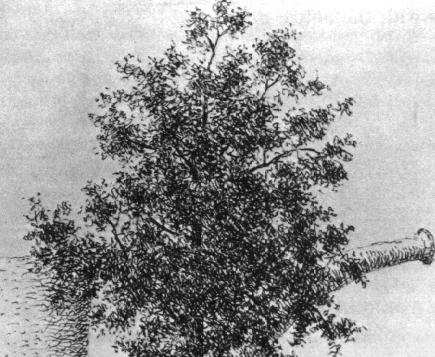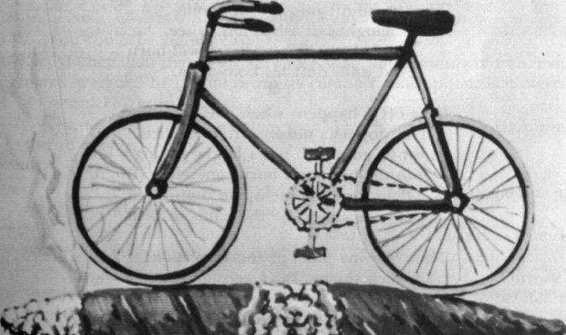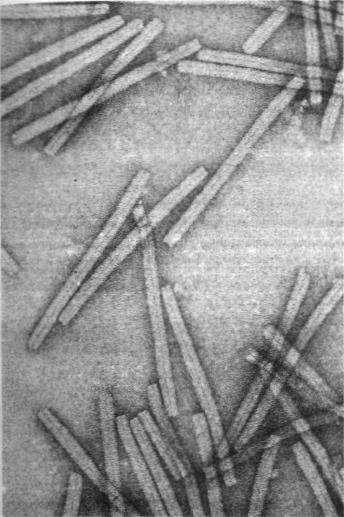Gödel, Escher, Bach: An Eternal Golden Braid (86 page)
Read Gödel, Escher, Bach: An Eternal Golden Braid Online
Authors: Douglas R. Hofstadter
Tags: #Computers, #Art, #Classical, #Symmetry, #Bach; Johann Sebastian, #Individual Artists, #Science, #Science & Technology, #Philosophy, #General, #Metamathematics, #Intelligence (AI) & Semantics, #G'odel; Kurt, #Music, #Logic, #Biography & Autobiography, #Mathematics, #Genres & Styles, #Artificial Intelligence, #Escher; M. C


Edifying Thoughts
of a Tobacco Smoker
Achilles has been invited to the Crab's home.
Achilles: I see you have made a few additions since I was last here, Mr. Crab. Your new paintings are especially striking.
Crab: Thank you. I am quite fond of certain painters-especially Rene Magritte. Most of the paintings I have are by him. He's my favorite artist.
Achilles: They are very intriguing images, I must say. In some ways, these paintings by Magritte remind me of works by MY favorite artist, M. C. Escher.
Crab: I can see that. Both Magritte and Escher use great realism in exploring the worlds of paradox and illusion; both have a sure sense for the evocative power of certain visual symbols, and-something which even their admirers often fail to point out-both of them have a sense of the graceful line.
Achilles: Nevertheless, there is something quite different about them. I wonder how one could characterize that difference.
Crab: It would be fascinating to compare the two in detail.
Achilles: I must say, Magritte's command of realism is astonishing. For instance, I was quite taken in by that painting over there of a tree with a giant pipe behind it.
FIGURE 77. The Shadows, by Rene Magritte (1966).

Crab: You mean a normal pipe with a tiny tree in front of it!
Achilles: Oh, is that what it is? Well, in any case, when I first spotted it, I was convinced I was smelling pipe smoke! Can you imagine how silly I felt?
Crab: I quite understand. My guests are often taken in by that one.
(So saying, he reaches up, removes the pipe from behind the tree in the painting, turns over and taps it against the table, and the room begins to reek of pipe tobacco.
He begins packing in a new wad of tobacco.)
This is a fine old pipe, Achilles. Believe it or not, the bowl has a copper lining, which makes it age wonderfully.
Achilles: A copper lining! You don't say!
Crab (pulls out a box of matches, and lights his pipe): Would you care for a smoke, Achilles?
Achilles: No, thank you. I only smoke cigars now and then.
Crab: No problem! I have one right here! (Reaches out towards another Magritte painting, featuring a bicycle mounted upon a lit cigar.)
Achilles: Uhh-no thank you, not now.
Crab: As you will. I myself am an incurable tobacco smoker. Which reminds me-you undoubtedly know of Old Bach's predilection for pipe smoking?
Achilles: I don't recall exactly.
Crab: Old Bach was fond of versifying, philosophizing, pipe smoking, and FIGURE 78. State of Grace, by Rene Magritte (1959).
music making (not necessarily in that order). He combined all four into a droll poem which he set to music. It can be found in the famous musical notebook he kept for his wife, Anna Magdalena, and it is called
Edifying Thoughts of a Tobacco Smoker'
Whene'er I take my pipe and stuff it
And smoke to pass the time away,
My thoughts, as I sit there and puff it,
Dwell on a picture sad and gray:
It teaches me that very like
Am I myself unto my pipe.
Like me, this pipe so fragrant burning
Is made of naught but earth and clay;
To earth I too shall be returning.
It falls and, ere I'd think to say,
It breaks in two before my eyes;
In store for me a like fate lies.
No stain the pipe's hue yet cloth darken;
It remains white. Thus do I know
That when to death's call I must harken
My body, too, all pale will grow.
To black beneath the sod 'twill turn,
Likewise the pipe, if oft it burn.
Or when the pipe is fairly glowing,
Behold then, instantaneously,
The smoke off into thin air going,
Till naught but ash is left to see.
Man's fame likewise away will burn
And unto dust his body turn.
How oft it happens when one's smoking:
The stopper's missing from its shelf,
And one goes with one's finger poking
Into the bowl and burns oneself.
If in the pipe such pain cloth dwell,
How hot must be the pains of hell.
Thus o'er my pipe, in contemplation
Of such things, I can constantly
Indulge in fruitful meditation,
And so, puffing contentedly,
On land, on sea, at home, abroad
I smoke my pipe and worship God.
A charming philosophy, is it not?
Achilles: Indeed. Old Bach was a turner of phrases quite pleasin'.
Crab: You took the very words from my mouth. You know, in my time I have tried to write clever verses. But I fear mine don't measure up to much. I don't have such a way with words.
Achilles: Oh, come now, Mr. Crab. You have-how to put it?-quite a penchant for trick'ry and teasin'. I'd be honored if you'd sing me one of your songs, Mr. C.
Crab: I'm most flattered. How about if I play you a record of myself singing one of my efforts? I don't remember when it dates from. Its title is "A Song Without Time or Season".
Achilles: How poetic!
(The Crab pulls a record from his shelves, and walks over to a huge, complex piece of apparatus. He opens it up, and inserts the record into an ominous-looking mechanical mouth. Suddenly a bright flash of greenish light sweeps over the surface of the record, and after a moment, the record is silently whisked into some hidden belly of the fantastic machine. A moment passes, and then the strains of the Crab's voice ring out.)
A turner of phrases quite pleasin',
Had a penchant for trick'ry and teasin'.
In his songs, the last line
Might seem sans design;
What I mean is, without why or wherefore.
Achilles: Lovely! Only, I'm puzzled by one thing. It seems to me your song, the last line is
Crab: Sans design?
Achilles: No ... What I mean is, without rhyme or reason. Crab: You could be right.
Achilles: Other than that, it's a very nice song, but I must say I am even more intrigued by this monstrously complex contraption. Is it merely an oversized record player?
Crab: Oh, no, it's much more than that. This is my Tortoise-chomping record player.
Achilles: Good grief!
Crab: Well, I don't mean that it chomps up Tortoises. But it chomps up records produced by Mr. Tortoise.
Achilles: Whew! That's a little milder. Is this part of that weird musical battle that evolved between you and Mr. T some time ago?
Crab: In a way. Let me explain a little more fully. You see, Mr. Tortoise's sophistication had reached the point where he seemed to be able to destroy almost any record player I would obtain.
Achilles: But when I heard about your rivalry, it seemed to me you had at last come into possession of an invincible phonograph—one with a
built-in TV camera, minicomputer and so on, which could take itself apart and rebuild itself in such a way that it would not be destroyed.
Crab: Alack and alas! My plan was foiled. For Mr. Tortoise took advantage of one small detail which I had overlooked: the subunit which directed the disassembly and reassembly processes was itself stable during the entire process. That is, for obvious reasons, it could not take itself apart and rebuild itself, so it stayed intact.
Achilles: Yes, but what consequences did that have.
Crab: Oh, the direst ones! For you see, Mr. T focused his method down onto that subunit entirely.
Achilles: How is that=
Crab: He simply made a record which would induce fatal vibrations in the one structure he knew would never change-the disassembly reassembly subunit.
Achilles: Oh, I see ... Very sneaky.
Crab: Yes, so I thought, too. And his strategy worked. Not the first time, mind you. I thought I had outwitted him when my phonograph survived his first onslaught. I laughed gleefully. But the next time, he returned with a steely glint in his eye, and I knew he meant business. I placed his new record on my turntable. Then, both of us eagerly watched the computer-directed subunit carefully scan the grooves. then dismount the record, disassemble the record player, reassemble it in an astonishingly different way, remount the record-and then slowly lower the needle into the outermost groove.
Achilles: Golly!
Crab: No sooner had the first strains of sound issued forth than a loud SMASH! filled the room. The whole thing fell apart, but particularly badly destroyed was the assembler-disassembler. In that painful instant I finally realized, to my chagrin, that the Tortoise would ALWAYS be able to focus down upon-if you'll pardon the phrase-the Achilles'
heel of the system.
Achilles: Upon my soul! You must have felt devastated.
Crab: Yes, I felt rather forlorn for a while. But, happily, that was not the end of the story.
There is a sequel to the tale, which taught me a valuable lesson, which I may pass on to you. On the Tortoise's recommendation, I was browsing through a curious book filled with strange Dialogues about many subjects, including molecular biology, fugues, Zen Buddhism, and heaven knows what else.
Achilles: Probably some crackpot wrote it. What is the book called:'
Crab: If I recall correctly, it was called Copper, Silver, Gold: an Indestructible Metallic Alloy.
Achilles: Oh, Mr. Tortoise told me about it, too. It's by a friend of his, who, it appears, is quite taken with metal-logic.
Crab- I wonder which friend it is ... Anyway_ in one of the Dialogues, I encountered some Edifying Thoughts on the Tobacco Mosaic Virus, ribosomes, and other strange things I had never heard of.

FIGURE 79. Tobacco Mosaic Virus.
From A. Lehninger, Biochemistry (New York: Worth Publishers, 1976).
Achilles: What is the Tobacco Mosaic Virus? What are ribosomes?
Crab: I can't quite say, for I'm a total dunce when it comes to biology. All I know is what I gathered from that Dialogue. There, it said that Tobacco Mosaic Viruses are tiny cigarette-like objects that cause a disease in tobacco plants.
Achilles: Cancer?
Crab: No, not exactly, but
Achilles: What next? A tobacco plant smoking and getting cancer! Serves it right!
Crab: I believe you've jumped to a hasty conclusion, Achilles. Tobacco plants don't SMOKE these "cigarettes". The nasty little "cigarettes" just come and attack them, uninvited.
Achilles: I see. Well, now that I know all about Tobacco Mosaic Viruses, tell me what a ribosome is.
Crab: Ribosomes are apparently some sort of sub cellular entities which take a message in one form and convert it into a message in another form.
Achilles: Something like a teeny tape recorder or phonograph?
Crab: Metaphorically, I suppose so. Now the thing which caught my eye was a line where this one exceedingly droll character mentions the fact that ribosomes-as well as Tobacco Mosaic Viruses and certain other bizarre biological structures-possess "the baffling ability to spontaneously self-assemble, Those were his exact words.
